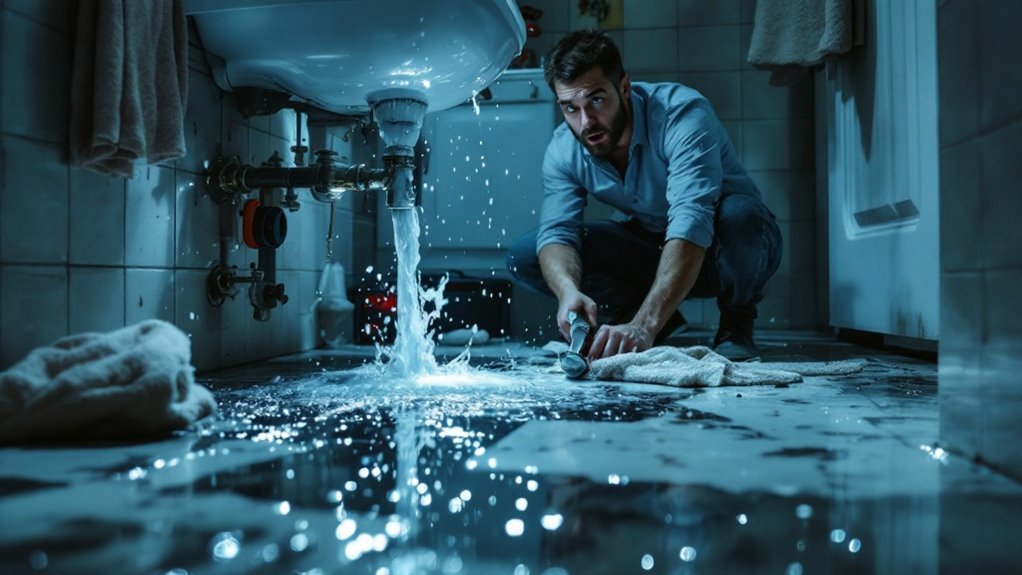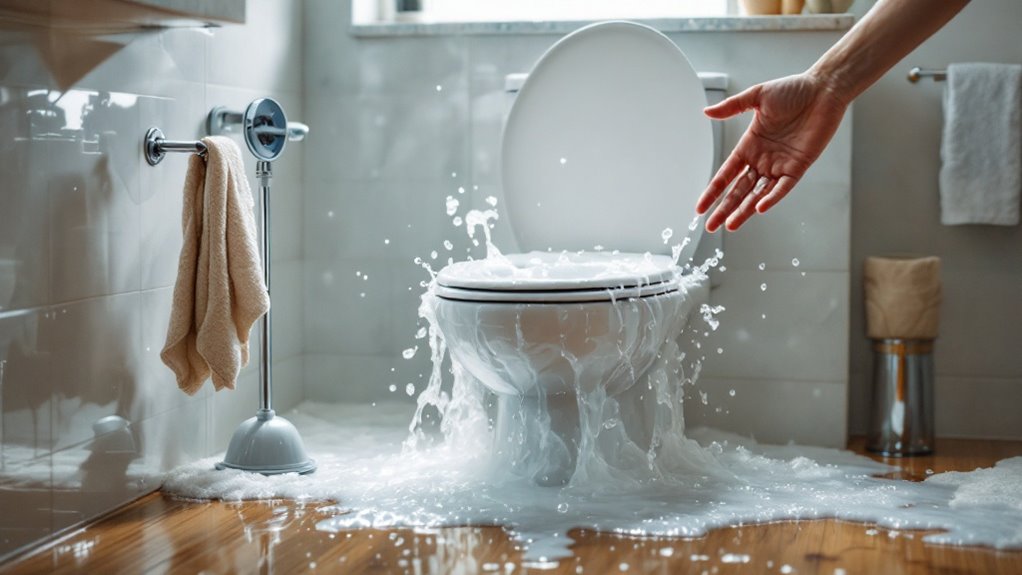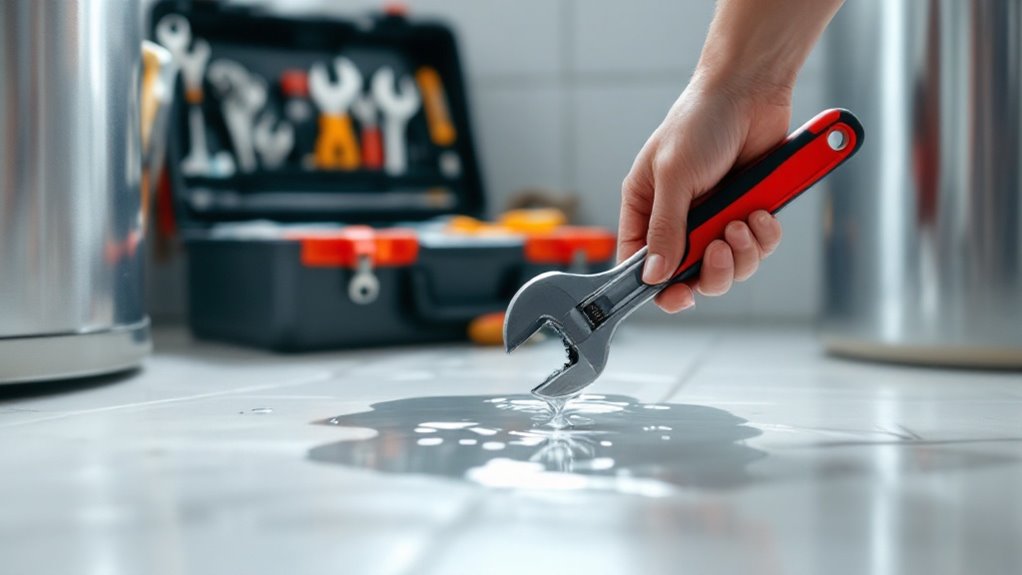When facing plumbing emergencies in Riverdale, focus on the top five: First, turn off your main water supply for burst pipes and call a plumber. Clear clogs with a mix of baking soda and vinegar or a plunger. For overflowing toilets, shut the valve off immediately. Fix leaky faucets by replacing worn washers and O-rings. Finally, troubleshoot water heater issues before contacting a professional. Stay tuned for detailed steps to manage each situation effectively.
Key Takeaways
- Burst Pipes: Turn off the main water supply, clear valuables, absorb standing water, and contact a plumber for assessment.
- Clogged Drains: Regularly flush drains with hot water; use baking soda and vinegar for DIY unclogging, and avoid chemical cleaners.
- Overflowing Toilets: Shut off the toilet valve, clear obstructions if safe, and call a plumber if the issue persists.
- Leaky Faucets: Turn off water supply, replace worn washers or O-rings, and reassemble faucet to prevent leaks.
- Water Heater Failures: Check power or gas supply, look for leaks, and perform regular maintenance; contact a professional for complex issues.
Burst Pipes: Immediate Actions to Take

When a pipe bursts, quick action is crucial to minimize damage and restore safety to your home. First, turn off the main water supply to prevent further flooding. Next, locate and assess the affected area; you'll want to clear any valuables and furniture to protect them. If you can, use towels or a wet vacuum to absorb standing water.
In terms of emergency preparedness, confirm you have critical tools nearby, such as pipe insulation materials and a wrench. Proper insulation can prevent future bursts, especially in colder months. Once you've managed the immediate crisis, contact a professional plumber to evaluate the damage and restore your plumbing system. Taking these steps can save you from extensive repairs and heartache later on. Additionally, remember that emergency plumbing services are available 24/7 to address any urgent issues that arise.
Clogged Drains: Quick Fixes and Prevention Tips
Clogged drains can disrupt your daily routine, but quick fixes and preventive measures can keep your plumbing flowing smoothly. Start with regular drain maintenance to prevent buildup; a monthly hot water flush can work wonders. For DIY unclogging, try a mixture of baking soda and vinegar, followed by hot water to break down grease and debris. If that doesn't do the trick, a plunger or a plumber's snake can help tackle tougher clogs. Always avoid chemical drain cleaners, as they can damage your pipes. Finally, consider installing drain screens to catch hair and food particles, which are common culprits. By staying proactive, you'll minimize the chances of future clogs and keep your drains clear. Additionally, emergency plumbing services are available 24/7 for urgent issues that require immediate attention.
Overflowing Toilets: How to Handle the Situation

To manage an overflowing toilet effectively, it's crucial to act quickly before water causes damage. First, locate the toilet shut-off valve, usually found behind the toilet near the wall, and turn it off to stop the flow. Next, remove any visible obstructions if it's safe to do so. Having an emergency kit handy can be invaluable; include a plunger and towels for quick cleanup. Remember, toilet safety is paramount—never flush during an overflow as it can worsen the situation. After you've controlled the overflow, assess the cause. If you can't fix it, call a plumber. Staying calm and prepared can make these emergencies less stressful.
Leaky Faucets: Simple Repairs You Can Do
After dealing with an overflowing toilet, you might notice another common plumbing issue: leaky faucets. These pesky drips can waste water and drive you crazy, but you can tackle them with a few simple DIY repairs.
Start by gathering your tools—here's what you'll need:
- A wrench for loosening fittings
- Replacement washers or O-rings
- Plumber's tape for a secure seal
For effective faucet maintenance, first, turn off the water supply. Disassemble the faucet, replace any worn components, and reassemble it carefully. Don't forget to check for leaks after turning the water back on. With a little effort, you can fix that leaky faucet and save both water and money!
Water Heater Failures: Troubleshooting and Solutions

What do you do when your water heater suddenly stops working? First, check the power supply or gas line. If that's fine, look for leaks or strange noises. Regular water heater maintenance is essential for energy efficiency and longevity. Here's a quick troubleshooting guide:
| Issue | Possible Cause | Solution |
|---|---|---|
| No hot water | Thermostat malfunction | Adjust or replace |
| Leaking water | Corroded tank | Replace the unit |
| Strange noises | Sediment buildup | Flush the tank |
| Pilot light out | Dirty pilot or gas supply | Clean and reignite |
| Discolored water | Rusty tank | Replace the unit |
Frequently Asked Questions
What Are Common Causes of Plumbing Emergencies in Riverdale?
In plumbing, the winter chill can symbolize frozen pipes, while the dark depths of a sewer backup represent hidden chaos. Both arise from neglect, improper insulation, or aging infrastructure, leading to urgent plumbing emergencies you can't ignore.
How Can I Prevent Plumbing Emergencies Before They Happen?
To prevent plumbing emergencies, you're encouraged to perform regular inspections and invest in preventive maintenance. Check for leaks, maintain your fixtures, and clear drains to guarantee everything functions smoothly and avoid unexpected issues.
When Should I Call a Professional Plumber?
When the storm clouds of plumbing issues gather, don't hesitate. If you notice emergency signs like leaks or strange noises, call a professional plumber. Their qualifications guarantee you'll weather the storm effectively and safely.
What Tools Are Essential for Fixing Plumbing Issues?
To tackle plumbing issues effectively, you'll need crucial plumbing tools like wrenches, pliers, and screwdrivers. Stocking an emergency kit with tape, plungers, and a pipe cutter can additionally help you respond quickly to unexpected problems.
Are Plumbing Emergencies Covered by Homeowner's Insurance?
Plumbing emergencies often fall under insurance coverage, but it varies based on your policy. You should review your homeowner's insurance and check for emergency claims related to water damage, as coverage differs considerably between providers.
